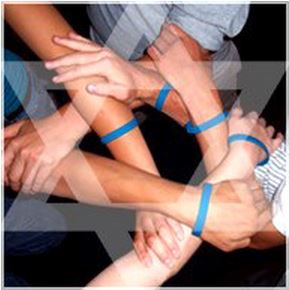Danielle V. Minson — Raising the Bar

Why Are Many Israelis Denied a Jewish Wedding?
Since Israel’s founding, as American Jews, our primary relationship with the Jewish State has been to give our support though funding, advocacy, education, and tourism. However, as Israelis increasingly debate issues that will define the character of the Jewish state for decades to come, American Jews want to have a voice.
We are painfully aware that as Americans, we are not burdened with Israel’s security concerns; our children are not drafted. Nevertheless, if Israel is to be the Jewish state for us, our children and grandchildren, we have a right and responsibility to weigh in.
We understand that Israeli society, due to Israel’s role and history, will always differ from American society. Most fundamentally, as the world’s only Jewish state, Israel cannot have “separation of church and state” in the way America does. A crucial question is how Israel can be a Jewish state, yet support a pluralistic society that respects different religious practices and levels of observance.
Historically, the secular founders of the state of Israel, in aftermath of the Holocaust, engaged the minority of Orthodox Jews then living among them by delegating authority for much of civil life to the Chief Rabbi. However, in recent years, tension has mounted as Israel’s Rabbinate has become an increasingly powerful political institution and the Orthodox sector has grown into a large and vocal political force. Unlike most of Israel’s founders, for whom religious practice was just not relevant, an increasing number of contemporary Israelis want to practice a style of Judaism that resonates personally with them.
As Americans, we take for granted the desire to choose among different denominations of Judaism. As similar concerns grow among Israelis new and difficult questions arise, such as how much pluralism will be permitted and how will this relate to the Rabbinate’s authority.
Marriage is the issue where this tension has become most dramatic for Israelis because Jewish weddings in Israel must be conducted by an Orthodox rabbi under the Rabbinate’s supervision. As a result, many couples are forced to hire a rabbi whom they don’t know or identify with.
Around 70 percent of Israeli Jews are not Orthodox and they are increasingly unwilling to be forced into a wedding that does not reflect their actual relationship with Judaism. Roughly 20-25 percent feel the need to wed outside Israel, often marrying in Cyprus, since a marriage conducted abroad is legally recognized once they return to in Israel. This option leaves these Israeli couples with a legal wedding, but not a Jewish wedding or a wedding surrounded by all their friends and family. Even more concerning is the growing trend of couples foregoing marriage altogether.
Over the last few years, the issue of marriage freedom in Israel has attracted increasing concern both in Israel and in North America. In the Knesset, several political parties have discussed and proposed bills offering new marriage and partnership options. As these political endeavors continue to unfold, coalitions on both sides of the Atlantic have formed in an attempt to afford Israelis the freedom to legally marry with the rabbi of their choosing.
Efforts to advance freedom of marriage in Israel are complicated and challenging. Nevertheless the Jewish Federation of Cincinnati feels that it is appropriate for American Jews to have a voice on this issue. This is not just because American Jews invest hundreds of millions of dollars in Israel, but because we want our children and grandchildren to feel connected to, advocate for, and support Israel for generations to come.
To understand this pressing issue, our Federation’s Israel Center will host Smadar Dekel Naim, an expert on Israeli marriage laws and the movement to create alternative Jewish weddings in Israel. She will speak on May 12 at Wise Temple.
Naim writes, “The status of marriage and divorce in Israel has deteriorated, distancing the secular Israeli public from the religious establishment and thus, sadly, also from the pleasant sides of the Jewish religion and culture. Every ceremony we conduct [outside of the official Rabbinate] contributes to three worthy struggles: promoting cultural diversity and pluralism in Israel; providing a solution to the legal shortcomings in the field of family law; and empowering women by giving them a platform and a voice as active brides.”
The Federation is also supporting a new national Jewish Federations of North America (JFNA) initiative to promote pluralism in Israel. The Global Planning Table of the Jewish Federations of North America proposed the formation of a new strategic initiative, the Israel Religious Expression Platform (iRep), to support issues of Jewish diversity and freedom of religious expression in Israel. It is a two-year pilot program to engage the Israeli public and participating North American Jewish communities, and act to enhance Israel’s civil society and to strengthen Israel’s relationship with North American Jewry based on mutual recognition of and respect for diverse Jewish expressions.
We are proud that Cincinnatian Kim Heiman is National Co-chair of this effort. “Marriage freedom is a critical and timely means of bolstering religious diversity in Israel. In light of growing attention and traction on local and international levels, marriage freedom is a strategic entry point for effecting change on Jewish diversity,” said Heiman.
The iRep Advisory Board represents a wide base of supporters from across the religious and political spectrum, including members of the Reform, Conservative, and Orthodox communities in Israel and in North America.
The Jewish Federation of Cincinnati has allocated $140,000 from the Community Campaign toward this initiative in Fiscal Year 2015. The majority of funding during the initiative’s two-year period will be used for the funding of nonprofit organizations whose work advances iRep’s mission.
While this program marks a beginning, our hope is that in the future, any child or grandchild from this community can easily choose to be married in Israel, with the same freedoms they would enjoy in Cincinnati.

